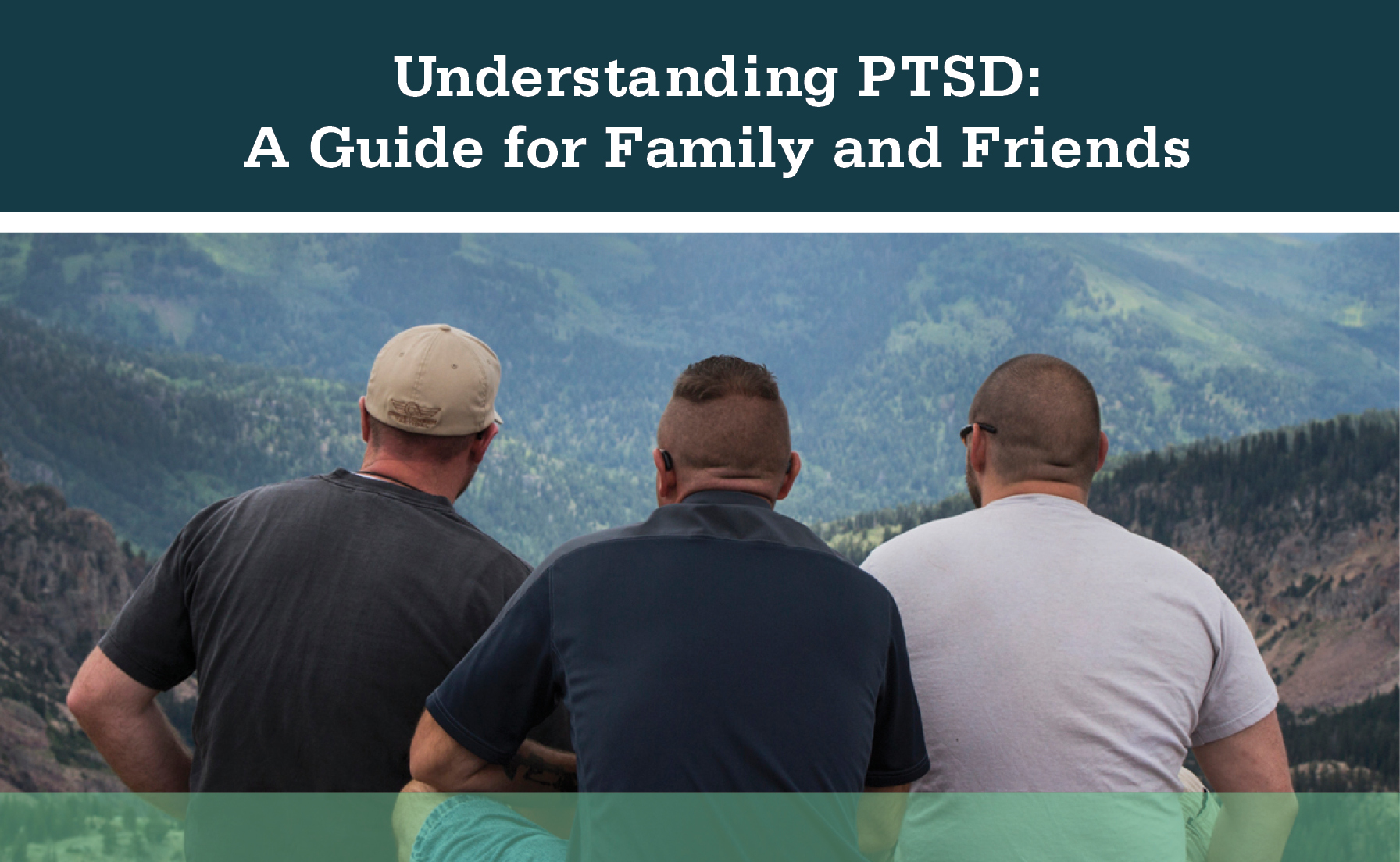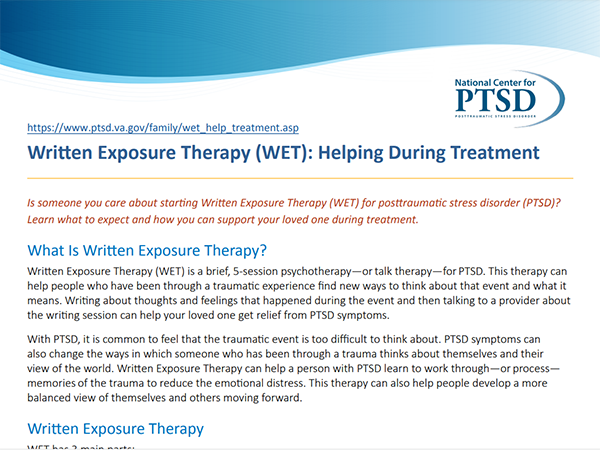PTSD: National Center for PTSD
Written Exposure Therapy (WET): Helping During Treatment
Written Exposure Therapy (WET): Helping During Treatment
Available in Español
Is someone you care about starting Written Exposure Therapy (WET) for posttraumatic stress disorder (PTSD)? Learn what to expect and how you can support your loved one during treatment.
Reading time: minutes
What Is Written Exposure Therapy?
Written Exposure Therapy (WET) is a brief, 5-session psychotherapy—or talk therapy—for PTSD. This therapy can help people who have been through a traumatic experience find new ways to think about that event and what it means. Writing about thoughts and feelings that happened during the event and then talking to a provider about the writing session can help your loved one get relief from PTSD symptoms.
With PTSD, it is common to feel that the traumatic event is too difficult to think about. PTSD symptoms can also change the ways in which someone who has been through a trauma thinks about themselves and their view of the world. Written Exposure Therapy can help a person with PTSD learn to work through—or process—memories of the trauma to reduce the emotional distress. This therapy can also help people develop a more balanced view of themselves and others moving forward.
Written Exposure Therapy
WET has 3 main parts:
- Education about PTSD and WET
- Completing a written trauma narrative and reflecting on the impact of trauma
- Processing the writing
1. Education about PTSD and WET
Written Exposure Therapy starts with education about PTSD and common symptoms. The therapist will provide information tailored to your loved one"s individual experiences, explain how WET works, and discuss the goals of treatment. You can help by:
- Learning about trauma, PTSD and WET. Knowing the basics is a great place to start. The resources listed at the end of this page can help.
- Asking your loved one to share information about what they"ve learned about PTSD and WET from their therapist. You can provide support for attending appointments even if they do not want to talk about session content.
2. Writing about the trauma and reflecting on the impact of the trauma
Written Exposure Therapy is a treatment that uses structured writing to help process traumatic experiences. Your loved one will be asked to write about their trauma during sessions with specific instructions to focus on their deepest thoughts and feelings about the event. The writing helps your loved one process difficult memories, thoughts and emotions. The therapist will help them stick with this writing and provide them with feedback to make sure they get the most from treatment. Examining the trauma memory can be difficult at first, but this exposure—or process of writing about the trauma memory—can help to reduce distress over time. Your loved one will be encouraged think about trauma memories, thoughts, and emotions between sessions and not avoid doing so.
In the latter sessions of WET, your loved one will be instructed to also reflect on the impact of their trauma. They will be asked to consider how their trauma has affected the ways in which they think about themselves, their relationships with others, and their view of the world. Your loved one will have the opportunity to write about these issues during sessions. They will also receive feedback from their therapist to help them continue to be thoughtful about how the trauma impacts them moving forward.
You can help by:
- Being willing to listen and understand if your loved one prefers to not discuss what's happening during the sessions. In some instances, it is helpful to say words of encouragement such as "I recognize addressing your PTSD is tough work. I am proud of your for doing it."
- Reminding yourself that it is ok if your loved one feels uncomfortable when focusing on trauma-related memories or beliefs. These feelings are usually brief and your loved one will likely feel better as WET continues. Encouraging them to face the difficult feelings may help them stick with and finish the treatment.
- Not asking to read the trauma narratives. You may be curious about the writing but know that the writing is meant to be shared between your loved one and their provider.
3. Processing the writing
After each writing session, your loved one will work with their therapist to process the experience of writing in session. Processing may mean thinking about how the trauma has changed the way they think about themselves, their relationship with other people, and the world. After writing about trauma, some people find that their views may shift, and they think about themselves and how they think about the meaning of the trauma in different ways. You can help by:
- Noticing positive changes in your loved one.
- Allowing your loved one time to adjust to a new way of thinking and feeling. New information processing may continue between sessions. Both you and your loved one can generally go about daily life as usual and let changes happen naturally.
- Reminding your loved one to feel their emotions and not avoid.
- Encouraging them to check back in with the therapist as needed.
Wrap Up
Written Exposure Therapy is effective for treating PTSD. Your loved one's decision to start or consider WET is a great first step in recovery. Understanding the basics of WET will help you support your loved one during the treatment process.
Printable Handout
Written Exposure Therapy (WET): Helping During Treatment
Download a PDF of this page which discusses what to expect and how you can support your loved one during WET treatment.
Additional Resources
There are more videos and programs to support family members or help you learn about trauma, PTSD, and PTSD treatments like Written Exposure Therapy. We recommend:
- Animated Whiteboard Videos: Short videos that use hand-drawn images to describe PTSD and effective treatments, including Written Exposure Therapy.
- AboutFace: Learn about PTSD from Veterans who've experienced it. Listen to their stories and find out how treatment turned their lives around. Hear from family members and clinicians as well.
- Understanding PTSD: A Guide for Family and Friends (PDF): A booklet that includes what you need to know to help yourself and your loved one with PTSD.
- VA Caregiver Support: Programs to help you care for the Veteran you love and for yourself.
- PTSD Family Coach App: Mobile app designed to provide support for concerned family members of those with PTSD.
You May Also Be Interested In

Understanding PTSD: A Guide for Family and Friends (PDF)
What you need to know to help yourself and your loved one with PTSD.


























